- Home
- P. T. Deutermann
Sweepers Page 2
Sweepers Read online
Page 2
Keeping his left leg pinned against the cage, he used his right knee to jam the croc’s head tighter into the upside down Y-shaped top of the gap, fighting the instinctive urge to recoil when he felt the tip of the croc’s head push into his groin. He was just able to snatch a breath before the croc started to thrash, never releasing the bite but trying now to get its head out -of the mangrove. Galantz clamped even harder with his right knee while searching desperately for the knife strapped to his right ankle, his left leg a rigid, thrumming column of muscle and bone, his right leg cramping with the strain of keeping the croc’s head jammed, but then he had the knife and was stabbing, slabbing hard into that relatively soft hide beneath and behind the croc’s jaws, pushing with all his strength, feeling the steel tip bumping on bone and gristle, and feeling the croc’s thrashing tail beginning to pound the water outside, making noise. Die, goddamn it. I can’t stand noise; the VC will hear it. But then there came an enormous underwater roar and an almost overwhelming squeeze of pressure that made him forget the croc and his arm and his mortal struggle under the mangrove.
At that instant, Sherman felt the deck under his feet squeeze up toward his seat as if a great fist had punched up from the bottom of the river, jamming his knees against the console, and then his helmeted head was banging off the overhead and he was going ass over teakettle onto the deck as a huge red and roaring wall of water shot up just in front of the boat, accompanied by a bellowing blast out of the river.
“Mine!” he yelled. The boat was wallowing around like a drunken pig, no longer as light in the bow as she had been. Through the crash of the water plume on the bow, he heard the boom of the big mortar on the fantail and then night became blinding day as Yank’s white phosphorous round went off right in front of them on the banks, close enough that he could feel the heat through the open door.
The 81 was echoed by the stuttering blast of the after 50-cal as Yank went into action against the bank, joined almost immediately by the forwaro 50’s.
Tag groped for the console, punching hard at the engine start buttons as he struggled to get upright. The welcome rumble of the engines was drowned out by the forward 50’s getting seriously into it. The flash from the 50’s revealed enough of the bank to determine the boat’s position. The ebb tide had been building fast, and he could see mangrove roots that looked like half-submerged prison windows in the flash of the heavy machine guns. For a heart-stopping instant, he imagined he saw a white face in the water. Reflexively, he grabbed both engine control handles and pulled them all the way back, causing the boat to lurch astern as the 800 tip of General Motors’ finest dug in, extracting her from the lethal riverbank even as a second mine went off, but this time about thirty yards in front of them. Sherman saw the dull red glare underwater just before another thick column of water erupted, rising impossibly high. But the boat was going full astern now, and the bank had already receded into the darkness, visible only as the point from which the boat’s 50-cal tracer rounds were ricocheting up into the night sky. After nearly a year on the rivers, his guys knew exactly what to do-lay down a withering fire on both banks long enough for him to get them all out of the kill zone.
After fifteen seconds of backing out into the river, he yelled a cease-fire over the phones. He reduced the backing bell and then shifted to ahead, spinning the steering wheel full over, turning down river. The sudden silence was startling, and his eyes were stinging as he realized that the pilothouse was filled with gunsmoke. He kicked out to clear his feet from a couple of inches of hot powder casings that were rattling around on the deck and burning his ankles.
“Station check,” he barked into the phones. His throat was so dry that his voice cracked, and he felt his heart pounding and his hands shaking.
No matter how many times, it still scared the shit out of you.
“Fifty-one, no casualties,” Kelly called from up above.
“I think I got rounds in the chamber and I know I got a hot gun.
“Fifty-two, no casualties,” the bosun’s laconic voice announced. “Clear bore. I’m outta fifty and I’m reloading the eighty-one.” Nothing, not even mines, phased Yank.
“Radio’s okay,” Ryker squeaked in his high-pitched voice. He laughed nervously. “But I think Jarret crapped his pants.
There was a moment of silence on the circuit as Sherman gathered his thoughts while he continued to turn the boat.
“Fifty-one, clear ‘em through the muzzle,” he ordered.
“Radio, check on the snipe. He was down in the hole.” No more radar, so he was flying blind out here. He flipped on the Fathometer. He could keep her’m the middle using the compass and the Fathometer.
“Snipe’s okay,” Ryker called back immediately. “Says we got water coming in, though. He’s linin’ up the pumps.
We bookin’ outta here, boss, or what?”
Sherman thought for a moment. They had been very, very goddamn lucky.
Two mines, and they still had the engines and the props. If the hull was holed, it was up forward, away from the engine compartment. His right knee and his head hurt like hell, and he suspected everybody had some minor injuries. But there had been no machine gunners waiting to shoot his aluminum-hulled boat to ribbons from spider holes in the banks. Or if there had been, the Swift boat’s immediate response with the 50’s had kept the bastards down.
Two loud bangs overhead made him jump as he climbed sideways back into the twisted chair.
“Bores clear, Fifty-one. What about the snake eater?”
This from Kelly as he jacked -open the gun’s chambers to make sure they were, physically empty
“Screw the snake eater,” Ryker offered. “I think it was me shit his pants. That was too goddamn close.” He was trying to keep it light, but Sherman could detect the fear in his young voice. He realized his own hands were still trembling.
“And Fifty-two here,” said Yank. “The eighty-one has a willie peter, locked and loaded. Ready for bear. Tell Jarret to gimme some more fifty-cal.”
try Okay, girls, let’s get it together,” She, man snapped ing to get some strength and authority back into his own voice. The boat was definitely settling by the nose. “We’re gonna go down the river,” he said. “See if we can get this bitch to that sandbar at checkpoint Kilo.”
“What about the SEAL?” Kelly asked again. At that moment, the starboard diesel engine misfired and then started to run ragged. Sherman swore and punched the right-hand shutdown button, and the engine died with a grudging rattle.
Shit, he thought. Bet we busted a fuel line. He energized both engine compartment bilge pumps to keep fuel from pooling and starting a fire.
The port-side engine kept humning.
“The SEAL’s on his own for now,” Sherman replied.
“Right now, we’ve got our own probs. Yank, you stay at your gun. Watch behind us for shooters. Kelly, get inside and help the snipe with those pumps. Send Jarret back aft to open the engine compartment doors, tell me what we’ve got going back there. We need to get Baby here onto that sandbar before she sinks on us.”
Sherman pushed the useless radar display unit out of the way and tried to think. They would drift away from the ambush area even without engines because of the ebb. The compass showed he was pointed east, which was roughly down river. But it was still pitch-black, and he wanted to be out in the’middle and not about to bump up against one of the banks.
What about the SEAL? Kelly had wanted to know. Obviously, the enemy had known they were out there. And known they were drifting. Which meant they probably knew there was a pickup going down. Which might mean the SEAL had been discovered, and perhaps made to tell them. when the boat was coming back. Or maybe they just knew the pattern. Have to mention that in the debrief He turned the wheel to take them across the river, watching the depth gauge as he did so. He snaked the boat back and forth across the river until he found the deepest part, then pointed her back east on the compass. From where they had started, they should run aground on
the sandbar at the dogleg sometime in the next hour, by which time another boat should be coming in to assist. What about the SEAL?
Well, the SEAL was probably dog meat by now. Sherman concentrated on the flickering red light of the Fathometer and saving his boat.
Too bad about the SEAL, but another boat would go back again tomorrow night and try again. That was the deal. You didn’t just leave a guy out there in the weeds.
THE PENTAGON, WASHINGTON, D.C., MONDAY, 10 APRIL 1995.
Rear Adm. Thomas V. Carpenter, Judge Advocate General of the U.S. Navy, was perplexed as he stared up at his aide over his half-lens reading glasses.
“A cop? A Fairfax County homicide cop? Wants to see me?”
His aide nodded. “Yes, sir. He just showed up here, with an escort from the security office. Says he needs to talk to you. Won’t say what about, Admiral.”
Carpenter leaned back in his chair. “Well, hell’s bells.
Send him in. But first get Captain Mccarty. I want-“
“The executive assistant is on his way, Admiral.”
“Yeah. Okay. Good. Soon-as he’s here, bring ‘em in.”
The aide left the office. Frowning, Carpenter swiveled around in his chair to look out the windows. His office was a large square room, paneled and carpeted, with shelves of legal books lining two walls, a conference table with leathertrimmed armchairs, an ancient leather couch, and three upholstered chairs arranged to face his desk. Behind his desk, a steel flag stand displayed the American flag and his personal two-star flag denoting a rear admiral of the staff corps.
Carpenter was one star short of having an office out on the prestigious E-ring.
There was a knock on the heavy mahogany door, and Capt. Dan Mccarty, his Pentagon executive assistant, came through the door. Mccarty, with twenty-nine years of service, was tall and thin, and he wore square horned-rimmed glasses that made him look bookish.
“A Fairfax County homicide detective, Admiral? You finally shoot one of those budgeteers?”
“That’s a thought,” Carpenter growled. “There’s some who desperately need it. But to answer your question, I haven’t the foggiest. Let’s get him in here. I have to see the Secretary in thirty minutes.”
The executive assistant opened the door and beckoned to the aide, who escorted the detective into the office. Carpenter was struck by how well dressed he was: expensivelooking three-piece suit, polished shoes, a flash of cuff links.
Mid-thirties, and in good physical shape. His stereotype of the scruffy’-looking, coffee-stained, potbellied, cigarette smoking TV homicide detective took a serious hit. This guy looked like a real pro.
The policeman introduced himself as Detective Mcnair of the . Fairfax County Homicide Section, sat down on the couch, and took out his notebook.
“Admiral,” Mcnair began. “You are the Judge Advocate General of the Navy, is that correct?”
“That’s right. I’m the JAG. I work for the Secretary of the Navy. I run the Navy’s legal corps, and provide military law counsel to the Navy.”
“Yes, sir.” Mcnair nodded. “I’ve come to see you at the recommendation of the Defense Investigative Service.
We’re working a’ situation, and frankly, we’re not sure what to do with it. It involves a Navy admiral. Sort of, I mean.”
Carpenter leaned forward. ““Sort of,’ Detective?”
Mcnair closed his notebook. “I guess I’m not being very clear. Last Friday night, a woman had a fatal accident in a town house out in Reston. At least it looks like an accident at this stage of our investigation. She apparently fell down a flight of stairs-from the main floor going down to the basement. She broke her neck in the fall. A neighbor found her Saturday morning. Her name was Elizabeth Walsh.”
“Sorry to hear it. But you said ‘apparently’?” Carpenter was still in the dark.
“Well, sir, she. definitely broke her neck. What we’re not too sure about is the genesis of the fall.”
“So this is a possible homicide? Is that what you’re saying?”
“Remote possibility, Admiral,” Mcnair replied.
“There’s some, ah, disagreement in the Homicide Section as to what we really have here.”
“Disagreement,” Carpenter said, looking over at his executive assistant.
“And why, specifically, should the Navy care, Detective?” asked Mccarty, getting right to it.
“Yes, sir. I was coming to that,” Mcnair replied. “As I said, we’re not sure that this is anything but an accident.
But on the possibility that it was not an accident, one of the things we checked for was a possible motive. If she was killed, say, pushed down the stairs, and I’ll admit that we have no direct evidence of, that, but if she was, then we have to ask why?”
“Cui bono’?” Mccarty said. “Who benefits from her death?”
“Yes, sir. Exactly. And someone does. Her lawyer told us there was an insurance policy-a big one. Two hundred fifty thousand, to be precise.
The beneficiary was one-“
He consulted his notebook. “One Rear Admiral W. T. Sherman. The Defense Department phone book says he’s assigned here at the Pentagon, on the staff of the Chief of Naval Operations.”
Carpenter drew a blank on the name. He looked over at his executive assistant again, his eyebrows raised in a silent question.
“He’s fresh-caught, Admiral,” Mccarty explained. “Last year’s selection list. He runs the Surface Warfare Requirements Division in OP-03. I think he’s been on board for about a year as a flag officer. Before that, he was the executive assistant to the Chief of Naval Personnel.”
“Oh, right,” Carpenter said. “Got it. I remember him.
Now, this insurance-policy business. This makes Admiral Sherman a suspect of some sort?”
“No, sir. There’s no crime, at least not so far. Like I said, there is no evidence of a homicide. There are some, um, forensic ambiguities.
Which is why I’m here talking to you instead of going directly to interview Admiral Sherman. Basically, I’m hereto ask a favor. Would you arrange a meeting between Admiral Sherman and us? An entirely informal meeting?”
Carpenter was starting to get the picture. “You mean as opposed to a formal police interview? Something we could call a conversation, say? So that we don’t have it getting out that the Fairfax County Police Department is interviewing a Navy admiral in connection with a possible homicide, when all you have are-what was it-‘forensic ambiguities’?”
“Yes, sir.” Mcnair nodded.
Carpenter sat back in his chair. “Let me speculate further,” he said.
“You went to your commonwealth attorney, told him you had a feeling about this case, and said you wanted to talk to Admiral Sherman. The CA told you to be very damn careful about pulling in a flag officer when you didn’t have any sort of case. Said he didn’t want any federal heat about harassment, or to listen to legions of federal lawyers raising hell because something got loose in the press.”
“His very words, sir,” Mcnair said admitingly.
Carpenter nodded. “Detective, we appreciate your discretion, and of course we’ll be happy to cooperate. I’ll speak to Admiral Sherman right away, and I’m sure we can work something out-as long as you can assure both of us when we meet that he is not suspected of any crimes. I will be present for this meeting, and I’ll want the right to shut it off if I think it’s going astray, all right?”
“Yes, sir,” Mcnair said. “I have no problems with that.”
“I’ll have my aide get back to you this afternoon, Detective.,., Mccarty remained behind after the aide shut the door.
“I’m amazed,” Carpenter said. “That they would be so discreet?”
Yes. I mean, admiral or no admiral, we’re all citizens first. If there’s been a homicide out there in civvy street, they’d have every right to go see him, or ask him to come down and see them.”
“Well, he did say that they’re not sure they even have a homicide.”
<
br /> “I guess I’m glad. Our-friendly hometown newspaper would love a little morsel like this. Okay, Dan, call this guy Sherman and have him come up and see me this afternoon.
And get me his bio.”
“Would you like me to handle this one, Admiral? Or maybe the Deputy?
Keep you at arm’s length and all that?” Carpenter thought about that for a moment. “We might do that eventually. But let me see his bio first, see if -I know this guy Sherman.”
At 5:30 that afternoon, Captain Mccarty brought Carpenter a manila folder. “This is the bio on Admiral Sherman,” he said. “The picture was taken when he was a captain, but he doesn’t look much different.”
“That’ll change,” Carpenter observed as he opened the file.
“He’s waiting out front, Admiral. If you’ll buzz me when you’re ready…”
“Just give me a minute to look at this and then you can bring him in.”
While Mccarty waited, Carpenter looked at the photo for a minute before scanning the career biography. The photo was that of a very young-looking officer with the sharp eyes and the taut-skinned face of an athlete. The face was composed in an expression of watchful authority that bespoke command at sea. He wore five rows of awards and decorations, which indicated he had wartime service in Vietnam.
The insignia worn over the ribbons indicated a surfacewarfare specialist.
He scanned the bio page. Naval Academy, class of ‘66.
First ship was a destroyer in San Diego. Then a year and a bit in the gunboat Navy, down in the Mekong Delta. Fun times, that must have been.
Then department-head school in Newport, a second tour in another destroyer in San Diego.
Then graduate school up at Monterey. Exec in yet another destroyer, then off to the Bureau of Naval Personnel in Washington. “Ah,” he said out loud. “The Bureau. He was a detailer.” Both of them knew that being a personnel assignment officer was one of the surer routes to the flag selection boardroom. After seeing the Bureau of Naval Personnel item, Carpenter barely scanned the rest of Sherman’s record.’ “Okay,” he said.

 The Nugget
The Nugget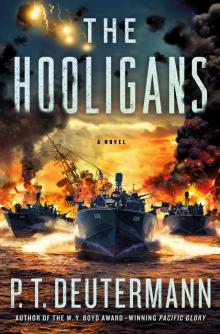 The Hooligans
The Hooligans SPIDER MOUNTAIN
SPIDER MOUNTAIN![Cold Frame [retail] Read online](http://i1.bookreadfree.com/i/03/19/cold_frame_retail_preview.jpg) Cold Frame [retail]
Cold Frame [retail] Sweepers
Sweepers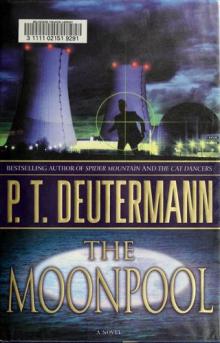 Cam - 03 - The Moonpool
Cam - 03 - The Moonpool Trial by Fire
Trial by Fire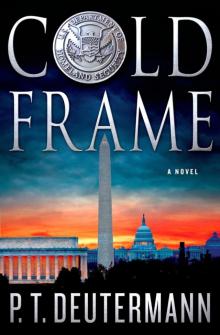 Cold Frame
Cold Frame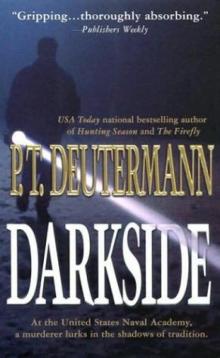 Darkside
Darkside Cam - 04 - Nightwalkers
Cam - 04 - Nightwalkers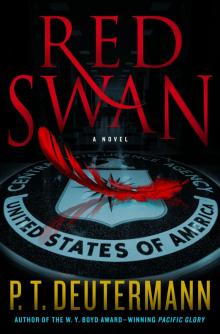 Red Swan
Red Swan The Commodore
The Commodore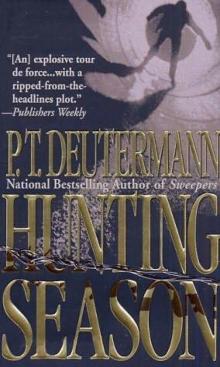 Hunting Season
Hunting Season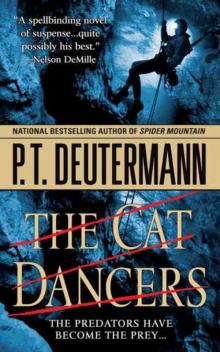 The Cat Dancers
The Cat Dancers Scorpion in the Sea
Scorpion in the Sea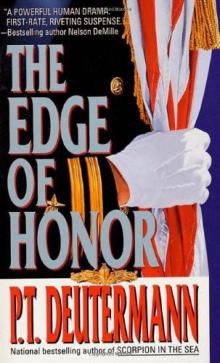 The Edge of Honor
The Edge of Honor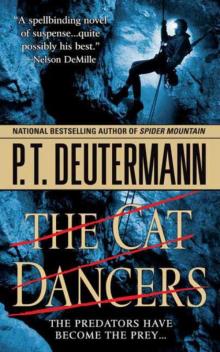 The Cat Dancers cr-1
The Cat Dancers cr-1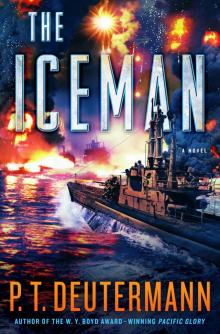 The Iceman
The Iceman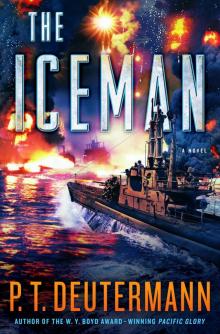 The Iceman_A Novel
The Iceman_A Novel Official Privilege
Official Privilege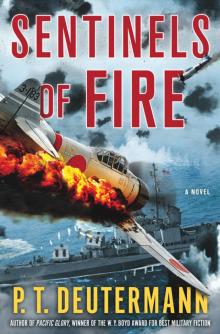 Sentinels of Fire
Sentinels of Fire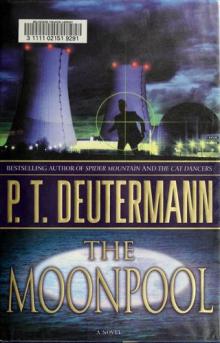 The Moonpool cr-3
The Moonpool cr-3 Nightwalkers cr-4
Nightwalkers cr-4 The Firefly
The Firefly Spider mountain cr-2
Spider mountain cr-2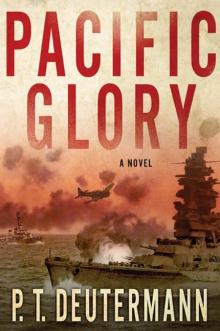 Pacific Glory
Pacific Glory The Last Man
The Last Man